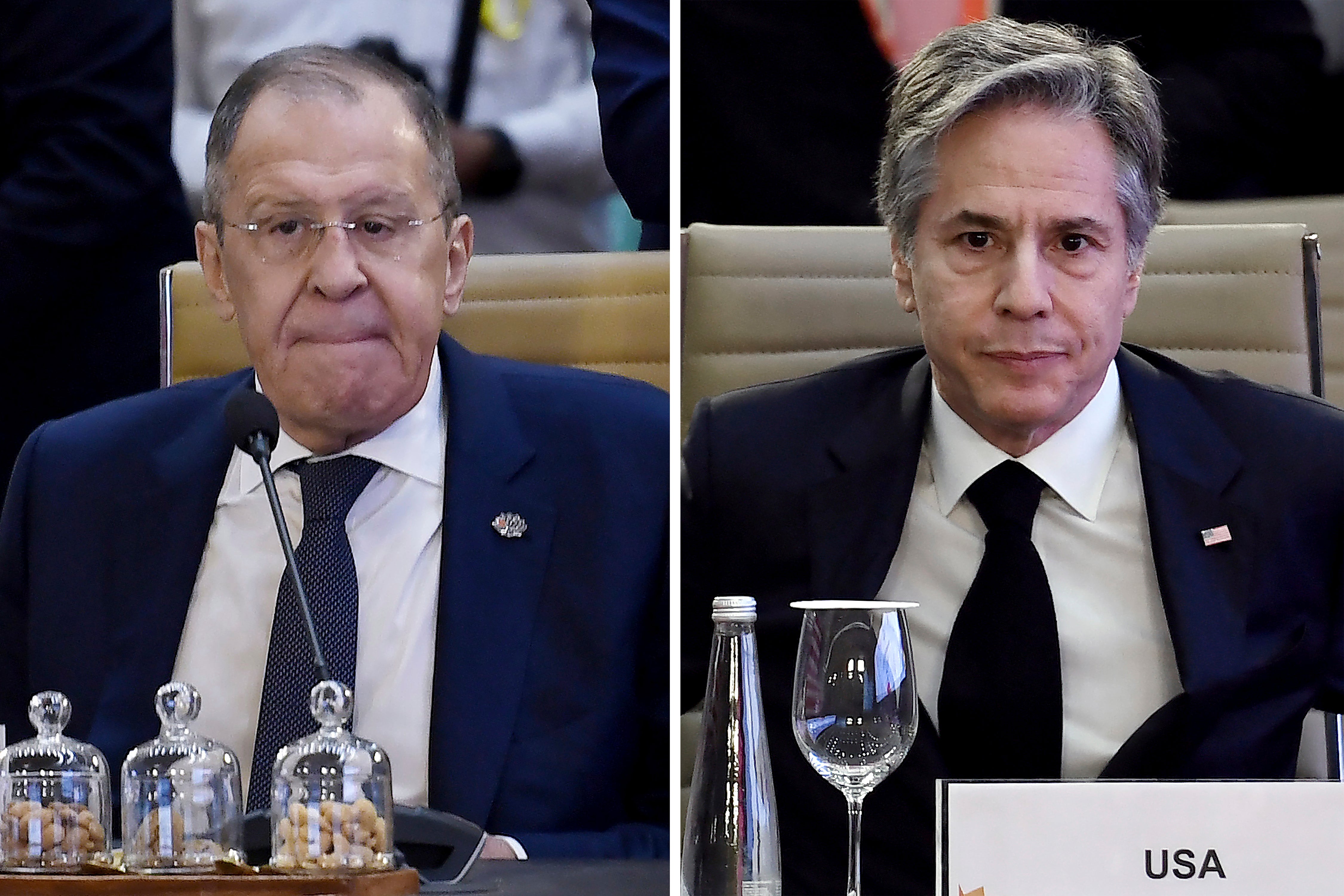G20 fails to agree on joint statement over Ukraine as Blinken meets Lavrov
It was the first meeting between the top US and Russian diplomats since Putin’s invasion

A meeting of G20 foreign ministers in Delhi ended without agreement over the conflict in Ukraine on Thursday, as US secretary of state Antony Blinken briefly met Russian counterpart Sergei Lavrov in their first encounter since the war.
Indian foreign minister Subrahmanyam Jaishankar said there would be no statement agreed by all nations “because there were differences on the Ukraine issue which we could not reconcile”.
Blinken blamed Russia for derailing the meeting and urged the G20 to call on Moscow to withdraw its forces from Ukraine.
“Unfortunately, this meeting has again been marred by Russia’s unprovoked and unjustified war against Ukraine, deliberate campaign of destruction against civilian targets, and its attack on the core principles of the UN Charter,” he told the gathering.
Mr Lavrov, who gave a press conference on his own shortly before Mr Jaishankar’s, said the meeting failed to reach an agreement because of the “emotional” approach to Ukraine from Western nations.
It is the second year running that the G20 foreign ministers’ meeting has failed to produce a joint statement, as last year’s in Bali ended in bitter disagreements over the war and Russia’s presence. The leaders’ summit later in December did agree on a statement, but only after Russia’s Vladimir Putin stayed away.
This week saw Delhi become the diplomatic capital of the world as 40 foreign ministers and delegates of leading economies descended upon India’s national capital for what has been billed as the largest such gathering in the history of the G20.
Arguably the most significant meeting came on the sidelines – an unscheduled 10-minute conversation between Mr Blinken and Mr Lavrov in what was the first contact between the top American and Russian diplomats since last summer.
A senior US official said the secretary of state raised three issues with Mr Lavrov, including Washington’s support for Ukraine for “as long as the war continues”, and that Moscow should reverse its decision to suspend participation in the New START nuclear treaty. He also demanded the release of Paul Whelan, a former US marine detained in Russia, the official said.
There was no immediate comment from Russia about the meeting and the US official did not elaborate on Mr Lavrov’s contributions, beyond stating that Washington does not expect it to have a meaningful impact on Russia’s course of action.
Indian prime minister Narendra Modi opened the meeting with a video address urging those gathered to “rise above [their] differences”. “We should not allow issues that we cannot resolve together to come in the way of those we can,” Mr Modi said.
In his closing remarks Mr Jaishankar said that there was agreement at the gathering on “95 per cent” of issues, citing “a considerable meeting of minds” on areas ranging from counterterrorism to the climate crisis. The full details of what was discussed and his chair’s summary would be released later, he said.
“There were two paragraphs where we were not able to get everybody on the same page,” he said. “There are occasions in diplomacy when you get 20 countries to agree on something, [and] there are occasions when you don’t.”
Another significant bilateral meeting came between Mr Jaishankar and the Chinese foreign minister Qin Gang, their first conversation since the latter entered that role. The pair discussed the “current state of the relationship” between India and China, which have been stuck in a bitter border standoff since 2020, Mr Jaishankar said.
Sushant Singh, a senior fellow at the Centre for Policy Research, told The Independent that the failure to produce a joint communique was “a setback for India” after it invested so much in the G20 presidency and its unique position as a neutral party in neither the Western nor Russian blocs when it comes to Ukraine.
“The Ukraine war and the China-US relationship cast a shadow over this meeting and if things do not change, India’s presidency of the G20 will not be the success Mr Modi expected it to be,” he said.
Suhasini Haider, the diplomatic editor of Indian daily newspaper The Hindu, said India certainly has a lot of heavy lifting to do between now and September when the full G20 leaders’ summit takes place in Delhi.
“[Mr Jaishankar] said himself that there were two paragraphs where some countries were not able to reach a consensus. I think for India it is disappointing for the reason that a foreign ministers’ meeting doesn’t have to have a joint communique. The fact that India tried for a joint communique itself is puzzling given the polarisation [between world powers],” she said.
“If [September’s] G20 summit ends without a joint statement that would certainly be a precedent, and India will do everything it can to avoid that. Indonesia was successful last year with India’s help – the question is, can India be successful this time?”
The prospect of a failed leaders’ summit is currently “likely” if “the present situation continues”, warned Harsh V Pant from the Delhi-based Observer Research Foundation. “India will have to ensure that its channel of communication is open with all sides so that it can push its concerns and [find a] consensus,” he said.






Join our commenting forum
Join thought-provoking conversations, follow other Independent readers and see their replies
Comments